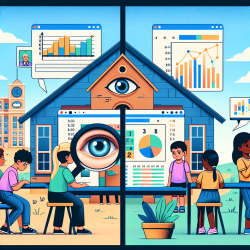Introduction
In today's digital age, screen time has become an integral part of children's lives. With the increasing use of digital devices, understanding the impact of screen time on children's development, particularly school readiness, is crucial for educators and practitioners. A recent study titled Children’s screen use and school readiness at 4-6 years: prospective cohort study provides valuable insights into how screen time affects children's readiness for school.
Key Findings from the Study
The study involved 876 Canadian children aged 4 to 6 years and explored the relationship between screen use and school readiness. The primary aim was to determine if screen use is associated with vulnerability in school readiness, as measured by the Early Development Instrument (EDI). The results were significant:
- Increased screen use was associated with increased vulnerability in school readiness (p = 0.05).
- Higher screen use was linked to reduced scores in language and cognitive development (p = 0.004).
- Among high screen users, there was a notable association with reduced communication skills and general knowledge (p = 0.042).
Implications for Practitioners
These findings underscore the importance of monitoring and managing screen time in early childhood. Practitioners can play a pivotal role in guiding parents and educators to foster environments that promote healthy development. Here are some actionable steps practitioners can consider:
- Educate Parents: Provide resources and workshops to educate parents about the potential impacts of excessive screen time on children's development.
- Promote Interactive Screen Use: Encourage parents to engage in co-viewing and interactive screen activities that can enhance learning and language development.
- Balance Screen Time with Physical Activity: Advocate for a balanced daily routine that includes physical activities and face-to-face interactions to support overall development.
- Encourage High-Quality Content: Guide parents to select educational and age-appropriate content that can positively influence learning outcomes.
Encouraging Further Research
While the study provides important insights, it also highlights the need for further research. Understanding the nuances of screen content, the context of use, and its long-term effects on various developmental domains can help refine guidelines and interventions. Practitioners are encouraged to contribute to research efforts by:
- Participating in longitudinal studies that explore the long-term impacts of screen time.
- Investigating the role of different types of screen interactions (e.g., passive vs. active) on development.
- Exploring cultural and socio-economic factors that may influence screen use and its effects.
Conclusion
The study clearly indicates that excessive screen time in early childhood is linked to increased vulnerability in school readiness, particularly affecting language and cognitive development. Practitioners have a crucial role in mitigating these risks by guiding parents and educators towards healthier screen habits. By fostering environments that prioritize interactive learning and balanced routines, we can help children achieve better developmental outcomes.
To read the original research paper, please follow this link: Children’s screen use and school readiness at 4-6 years: prospective cohort study.










